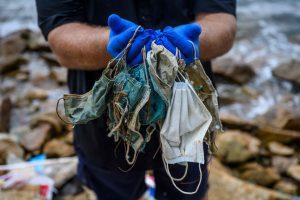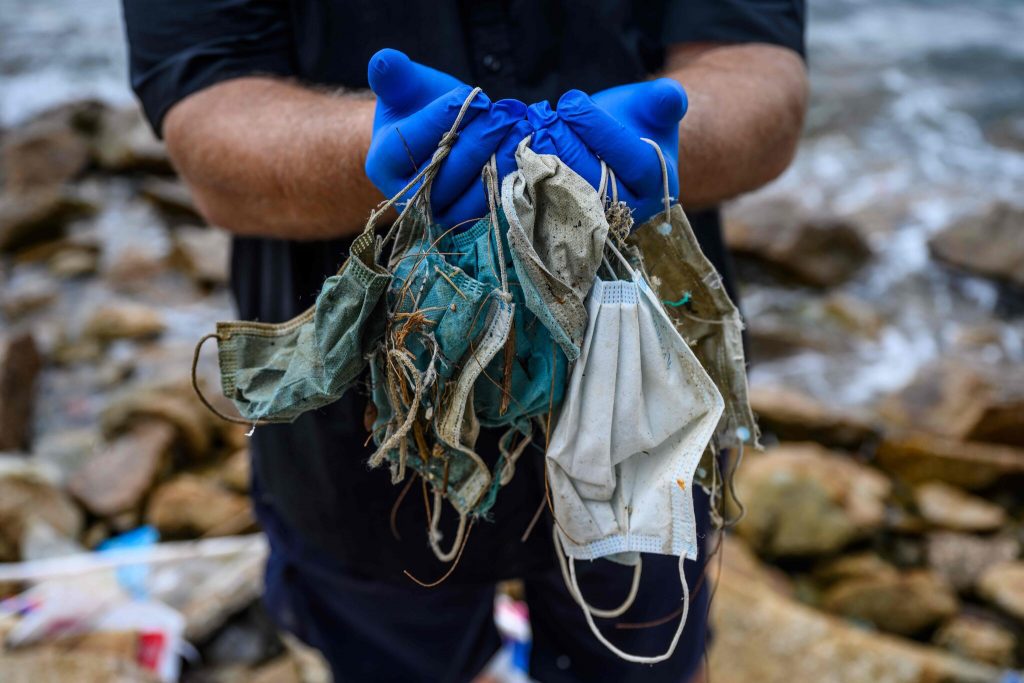Over 50 Million Facemasks Go To Landfill Each Day And The Litter Is Killing Wildlife
Keys, phone, facemask; this is the new routine as we prepare to go out and about during the Covid-19 pandemic, but what you do with your used facemask has unwanted consequences. Over 50 million facemasks go to landfill each day and the litter Is killing wildlife.

Over 50 Million Facemasks Go To Landfill Each Day And The Litter Is Killing Wildlife
It’s impossible to miss the sheer volume of facemasks that have been carelessly littered around our towns and cities, and these facemask hypocrites have infuriated one major waste disposal company. UK based waste disposal specialists BusinessWaste.co.uk are calling for people to make the switch from disposable face masks to reusable ones in a bid to reduce this littering.
Company spokesman Mark Hall says, “Animals are dying because they are getting tangled up in face masks that have been ignorantly thrown away, and somebody has to pick up your germy rubbish. Over 50 million facemasks are being thrown away each day. We need to fight the virus and keep ourselves safe in a way that doesn’t end up killing the planet and animals with single-use waste.”
PPE pollution
Wearing a face mask has become mandatory for the majority of us in the UK, as we are required to wear them on public transport, inside shops, and now even while being seated in cafes and restaurants.
But as over half of the population opt to wear single-use masks instead of reusable ones, it’s estimated that over 1.6 billion non-biodegradable face masks are being sent to landfill in the UK monthly and that figure is rising fast.
With so many of these throwaway masks being regularly used, it’s not surprising that many of these are not being disposed of correctly and are being dropped in streets up and down the country.
Hall: “We’ve heard tales of masks being found along motorways, in nature reserves, and my friend told me he found one blowing around the top of Ben Nevis when he trekked to the summit a few weeks ago. It’s disgusting, it’s dangerous, and it will destroy our planet and its wildlife.”
There have already been reports of animals being found tangled up in PPE, with the RSPCA releasing pictures of a seagull that was rescued in Essex as its feet were entangled in a face mask.
Steve Shipley in Yorkshire snapped a picture of a peregrine falcon struggling to detangle itself from a face mask, which could have been a tragedy as there are only about 1,000 breeding pairs in the UK
Spokesman Mark Hall says, “Many of us have seen the sad images of sea creatures swimming surrounded by plastic and vowed to live sustainably, and now that we can see how face masks are threatening our wildlife we need to act quickly and change our habits.”
Choose to reuse
Earlier in the year, BusinessWaste called for “pop-up PPE bins” on high streets to reduce littering and ensure that contaminated masks and gloves were being correctly disposed of, but as PPE pollution has increased, they are now also calling for people to make the switch from single-use to reusable as much as possible.
Single-use face masks take over 20 years to break down in landfill, but even if it’s correctly disposed of it cannot be recycled as it is considered to be medical waste.
Hall: “Even if you are disposing of your mask correctly as medical waste, it will need to be incinerated and the toxic fumes can contribute to climate change, so it’s best to avoid using them to begin with.”
Reusable fabric face masks are the most eco-friendly way to keep yourself and your loved ones safe, as well as preventing an increase in single-use waste which is harmful to our planet.
Instead of being thrown away after a single wear, reusable masks can be washed after each use, either by chucking them in the washing machine or handwashing them with soap and water.
Plus buying a reusable face mask will save you a lot of money, as you will get more use out of one mask than to keep repurchasing disposable ones.
But if you do find yourself having to wear a single-use face mask, you can still make sure you are disposing of it in a way that is less harmful by cutting the elastic straps that animals get tangled in.
Hall: “If you’re throwing away a face mask you have to treat like the plastic rings you get with beer cans, you need to cut anything an animal can get tangled up and eventually die in. We all need to do our bit to clean up our streets and save our wildlife.”
Read More:
david conrad married to nina Garcia

fashionabc is a fashion technology platform, comprising a digital directory and various other digital tools and supply chain solutions for the fashion industry ecosystem, that focus on ethical fashion and sustainability. We are building inclusive digital transformation tools for fashion professionals who are willing to take steps towards a more sustainable ethical fashion industry, by adopting AI and DLT blockchain technology.
* building digital profile and IP solutions for fashion businesses
* tackle issues such as provenance and counterfeit in supply chain
* contribute to the construction of a meritocratic ethical fashion industry which is certified and part of the circular economy











